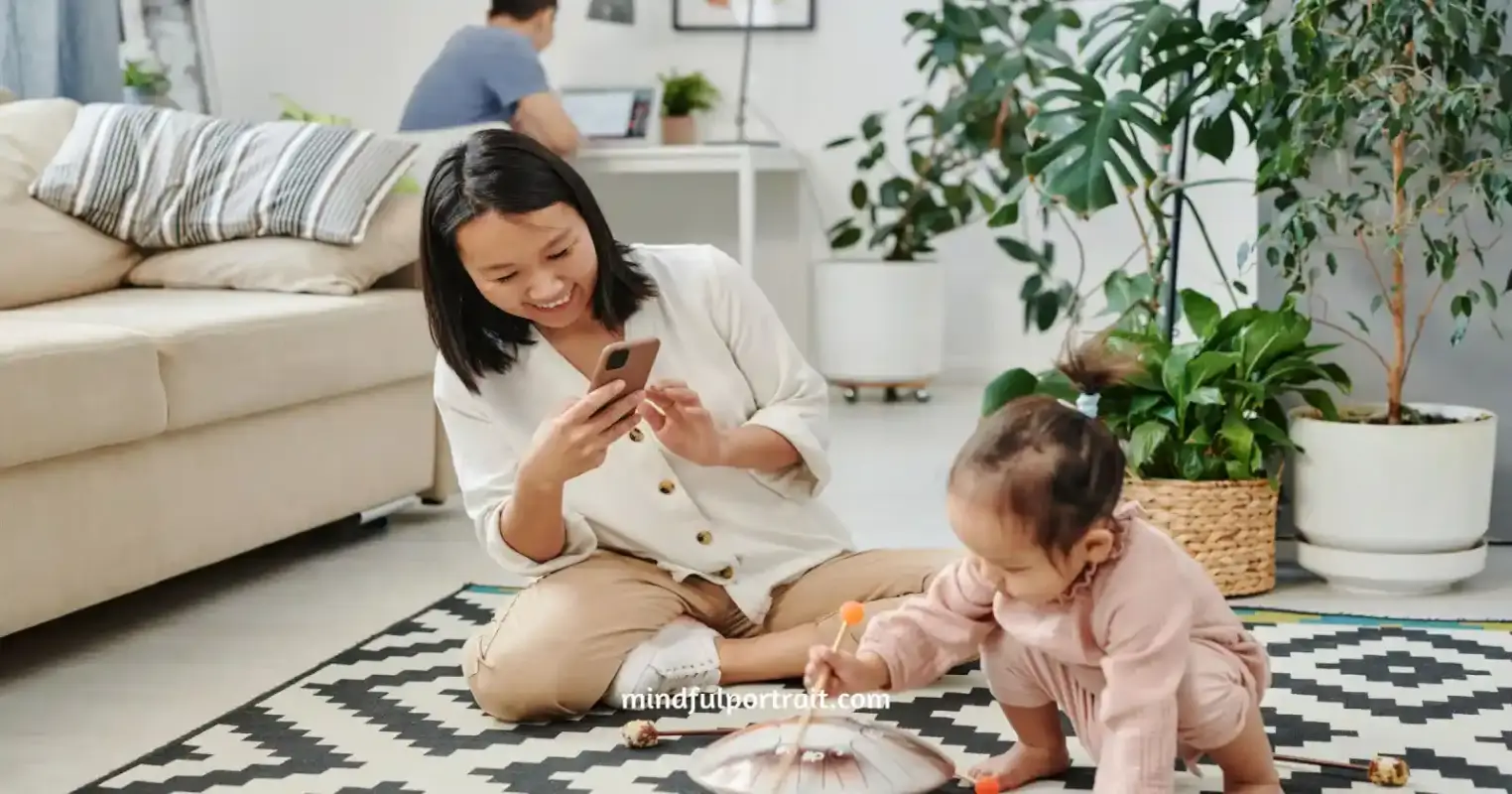Sharenting is a silent threat. It grows alongside us, going unnoticed, and we fail to recognize its consequences until it’s too late. We are all proud to be part of a generation that is aware of mental health, lives mindfully to protect our kids from the trauma we experienced, and works on healing our own trauma.
But are we sure we are on the right track in preventing childhood trauma from being formed in our children? Discussions, debates, and research on sharing children’s pictures have been ongoing since the early 2010s, yet parents continue to share these images.
What is Sharenting?
Sharenting means excessively sharing one’s parenting journey. It refers to parents sharing almost everything they have documented about their child, often without thinking twice.
This includes posting photos or videos of the child, ranging from everyday moments to their achievements, mischiefs, milestones, tantrums, and more. It also involves sharing detailed information about the child through blogs, social media posts, write-ups, or experiences in online forums, often revealing their identity.
Could Sharenting Lead to a New Wave of Childhood Trauma?
We often talk about childhood trauma and share the impact of our own experiences to help others. The irony is that we share our children’s lives just as openly as we share our stories of trauma.
When we criticize the parenting styles of older generations, believing ourselves to be more progressive, we often fail to realize that we too are becoming ‘old school’ to our children. Following trends gives us the confidence that we are progressive, but in reality, being progressive is something else. Just as our parents once believed overprotection, strictness, or emotional threats were harmless, we believe sharenting is harmless today.
Every individual is unique, and every family has its own core values and ideologies. If we can’t fully agree with our parents’ parenting principles, how can we expect our children to accept what we’re doing to them? Does this give us a reason to be mindful of sharing their lives online, creating a digital footprint that could risk their privacy, identity, and trust? While we have the option to delete posts or change privacy settings, can we ever be 100% sure that these pictures haven’t already been shared or are no longer in someone else’s hands?
Think about this: Haven’t you had childhood pictures that you didn’t like, which you purposely didn’t let your friends see during your teenage years? Or haven’t you lied or chosen not to share some awkward childhood stories with your partner or children, just because you didn’t want them to judge you based on that or because you were embarrassed? You probably didn’t want them to remind you of those moments or address you based on them. So, shouldn’t children also have the freedom to choose?
Dangers of Sharenting
- Seeking validation: Just as overprotective or overbearing parenting can create people-pleasers, the same can happen with sharenting. Children may grow up believing that their ultimate goal in life is to please others or seek validation—whether through likes or shares, a habit formed from childhood.
- Identity Theft: We were once worried about online fraud, and many of us learned how to protect ourselves from scams and hackers. Yet, even now, we see popular influencers fall victim to their accounts being hacked. So, what might the future hold with more powerful AI? What happens when we unknowingly reveal everything about our children—such as their date of birth, place of birth, voice modulation, and more—giving fraudsters the opportunity to steal their identities?
- Pressure to be perfect: We were once taught to prioritize experiences over material things. Now, we need to learn that not everything we document is meant to be shared. Some moments are for making memories and having fun, not for creating picture-perfect images for our followers. Sharenting can mislead children about the true meaning of experiences, emotional connection, and family bonding, as they lose the chance to enjoy the judgment-free, relaxed atmosphere of home.
- Parent-child Bond: For us, one of the biggest childhood challenges was being compared to others or scolded in front of friends and teachers. Similarly, our parents would control us by threatening to reveal our behavior. Today, we often ignore our children’s consent when sharing their moments online—whether it’s mischievous behavior or personal details. What we might see as cute or educational can harm their self-confidence, self-esteem, and trust in us. This can lead them to hide things from us, fearing their privacy might be shared online.
- Bullying: Who can predict how our children will cope with the constant criticism and bullying from friends, family, and random strangers or comments on the content shared online once they reach adolescence and face an identity crisis?
What if my parents had done sharenting?
I used to love singing when I was in school – always participating and winning in competitions. But as I grew older, I lost interest. Singing in public no longer felt right, simply because my passions and life goals had shifted. I had the freedom to make that choice, to change direction without worrying about preserving an image. I wasn’t afraid of being judged or labeled a failure for moving on. No one was there to ask, “What happened to her?” or measure my worth by my past talents. This is the freedom I gained from growing up in an era free of sharenting – the ability to evolve, to do what I love without the pressure of living up to others’ expectations, and to live life on my own terms.
How to Avoid Harmful Sharenting Practices?
Even though many are now aware of the risks and choose to blur their children’s faces or protect sensitive information like their names, school, and location, the question remains: Is that all we need to do to protect our children from the dangers of sharenting, especially as we step into a future dominated by AI?
Here are some tips for more responsible parenting when it comes to your child’s online presence.
1.Always reevaluate the content you share. Make sure there’s nothing that could embarrass your child at any stage of their life. Avoid revealing too many personal details, sensitive moments, or information that could lead to regret later on.
2.Not all trends are meant for you. Just because everyone is sharing doesn’t mean you have to. We need to remind ourselves that choosing not to share doesn’t make us any less than anyone else, and we don’t owe anyone an explanation about the most personal decision we made.
Learn more about the 8 parenting trends to stop following in 2025.
3. Enjoy social media in your own way – No rigid rules, and don’t take everything too seriously. Be flexible. If you want to share and enjoy, go ahead, but do so responsibly by knowing where to draw the line to protect your child’s security, privacy, and mental health. Stopping sharenting doesn’t mean cutting your child out of family photos or happy moments; it’s about setting boundaries and limits.
4. If the urge to stay connected or feel present is your motive behind sharenting, it’s not worth the risk. What is meant to be ours will always find its way to us. Genuine connections—those we can rely on for emotional and physical support, meaningful moments, and enriching experiences—cannot be replaced by likes and comments.
5. Choosing not to share is just one step, especially in a world where sharenting is normalized and even idealized. It’s equally important to teach children resilience and ensure their values aren’t tied to the number of likes or followers they receive.
6. Instead of thinking about the world through your perspective, imagine your child as a separate individual, one who will grow into an adolescent and adult with their own personality and views. Consider the world 10 years from now, the world your child will experience. Will the content you’re sharing empower them or expose them? How will their online experiences influence who they become?
7. Does this mean you should live a completely private life? Not at all. If you can enjoy it, continue sharing your experiences, educating others, and supporting those in need—but always with your child’s future in mind. Just be creative and trust in your abilities.
Reflections from Mindful Portrait

Sharenting has been with us and will continue to be for a long time. Despite the countless discussions and resources pointing out its negative side, it’s still continuing. And when everyone’s sharing every little thing about their kids, if you don’t, you’re the odd one out. But, is it really worth it? That’s the reality we live in. Normalizing, glorifying, or celebrating sharenting has become the trend, but it’s time to recognize the need for balance. Being mindful of our lives, our parenting, and our actions can lead to a transformation that preserves the integrity of our families and protects the future of our children.

